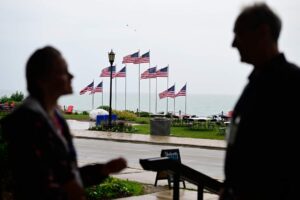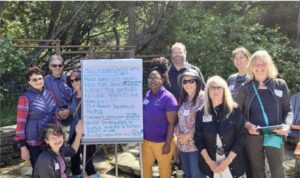[From the The Cincinnati Enquirer]
Over the past few years, I’ve led dozens of workshops in which ordinary Americans across the ideological spectrum share their strongly held political views. It’s no surprise that liberals and conservatives have deep disagreements on the core issues facing America. But they usually agree on one thing: Congress is broken.
As one participant exclaimed: “Please stop fighting all the time and get things done!”
As another reflected: “Neither side is going to finally vanquish the other. So we’d better figure out how to get along and run the country together.”
It’s not just the constituents who are upset with the current environment. Members of Congress themselves are sick of being a legislator in today’s toxic, hyper-partisan environment.
“Many Members are just as fed up with the dysfunction and partisanship as the American people,” said Rep. William Timmons (R-SC).
“People ask me how I’m doing as though I’ve been diagnosed with a terminal illness!” said Rep. Derek Kilmer (D-WA).
Kilmer and Timmons are the chair and vice chair of the Select Committee on the Modernization of Congress, which includes six Democrats and six Republicans – including Ohio Reps. Bob Latta and David Joyce – and works to develop recommendations to make Congress more effective, efficient, and transparent on behalf of the American people. At a time when political polarization has normalized rancor, dysfunction and gridlock, their work could not be more timely and critical to the future of our democracy.
Last week they reached out for help, inviting me to testify on how members of Congress can reverse the cycle of demonization and come together across the partisan divide to build understanding, grow trust and foster a new culture of civility and collaboration.
It starts, I told them, with relationships that lead to trust.
Over the course of the past five years, my nonprofit, Braver Angels, has developed several workshops and structured conversations that bring “reds” and “blues” together to help us better understand each other’s perspectives, reduce stereotyped thinking and explore common ground. Out of these workshops have emerged 75 local Braver Angels Alliances of liberals and conservatives working together to drive positive change in their communities. Five of these Alliances are active in Ohio, where we held our first workshop after the 2016 election.
In 2019, I conducted our first-ever congressional workshop with the staffs of two members of Congress in my home state of Minnesota: Democratic Rep. Dean Phillips and Republican Rep. Pete Stauber. The workshop gave the two staffs the opportunity to get to know each other as human beings, not just partisan actors. It enabled them to open up about their politics and values in an honest and non-judgmental way. It planted a seed of trust.
This year, we’re planning to do more red/blue workshops with congressional staffs, and we’re inviting members of Congress to participate in private one-on-one conversations across the divide to build relationships away from Twitter and the cameras. We’re piloting a new town hall where members can connect with bipartisan citizen groups to focus on common ground concerns and common ground solutions. If the pilot is successful, we envision eventually offering the program to every member of Congress.
This is only the beginning. There is a movement growing in this country to depolarize our politics, and Congress has begun to listen.
As I told the committee at the end of my testimony:
“Like a couple who remain responsible for their children no matter what happens to their own relationship, reds and blues cannot simply walk away from each other. Neither side can ‘divorce’ and move to a different country. To paraphrase Benjamin Franklin, it’s our republic, if we can keep it.”
William Doherty is a marriage and family therapist, a University of Minnesota professor, and a co-founder of Braver Angels.




